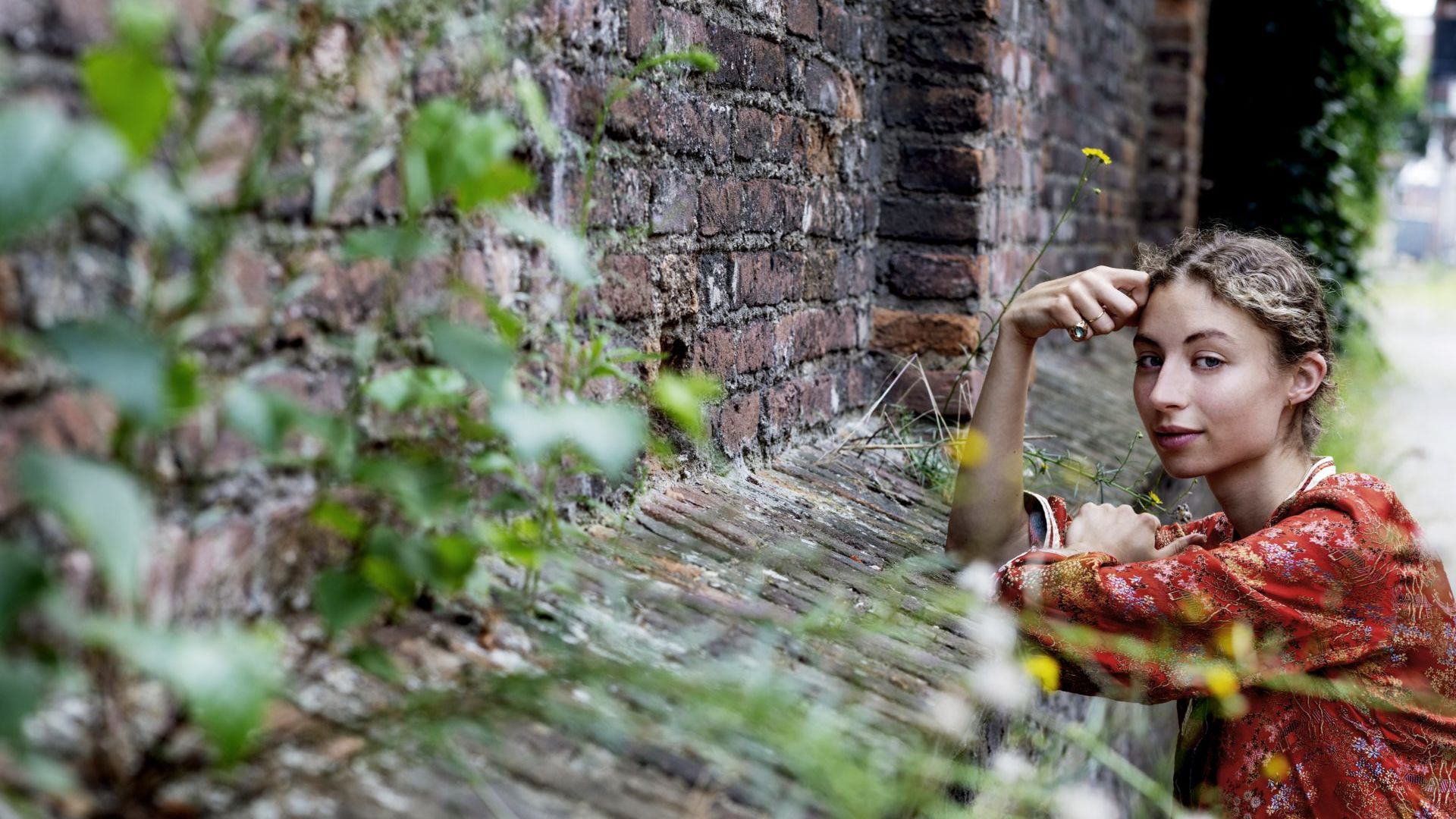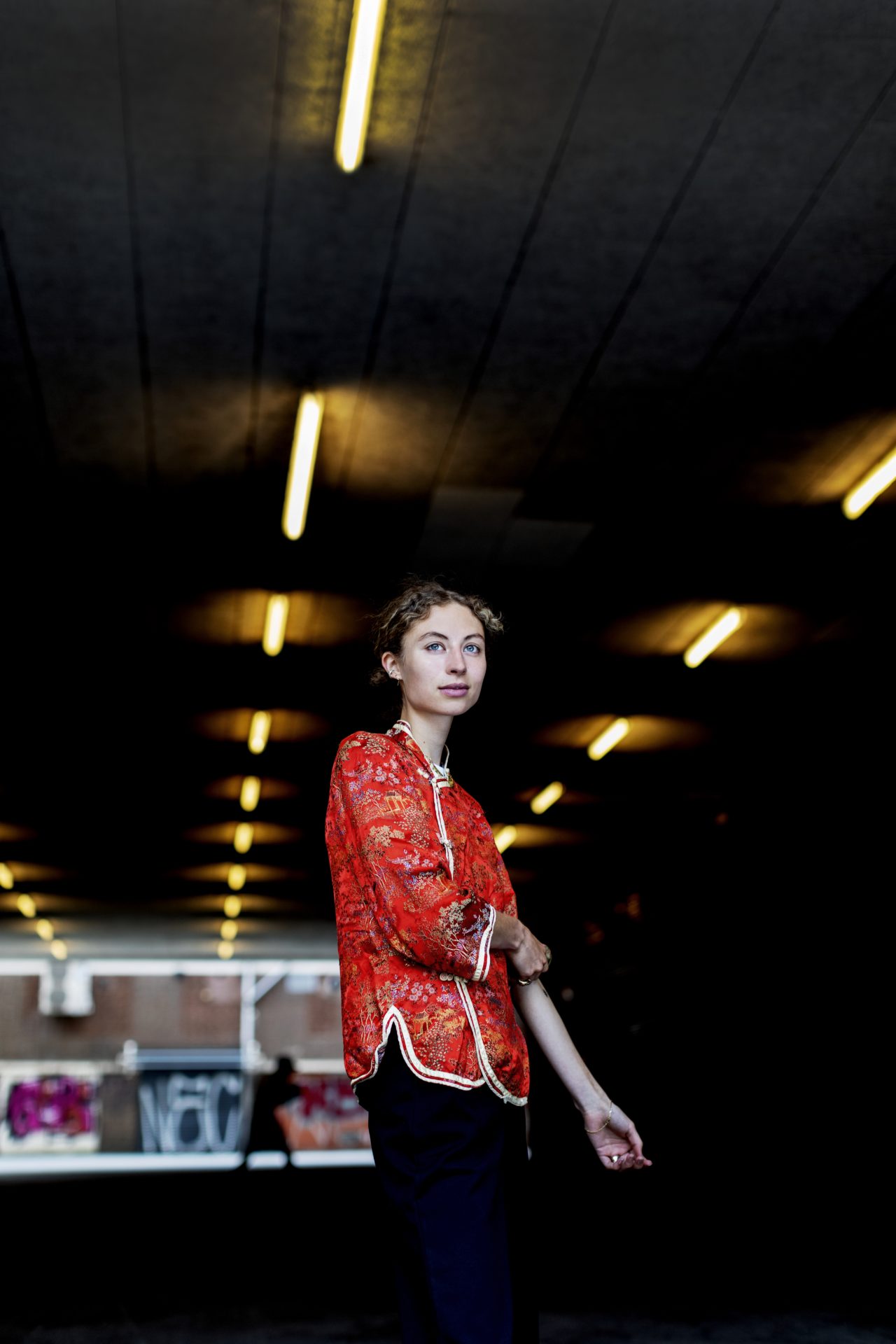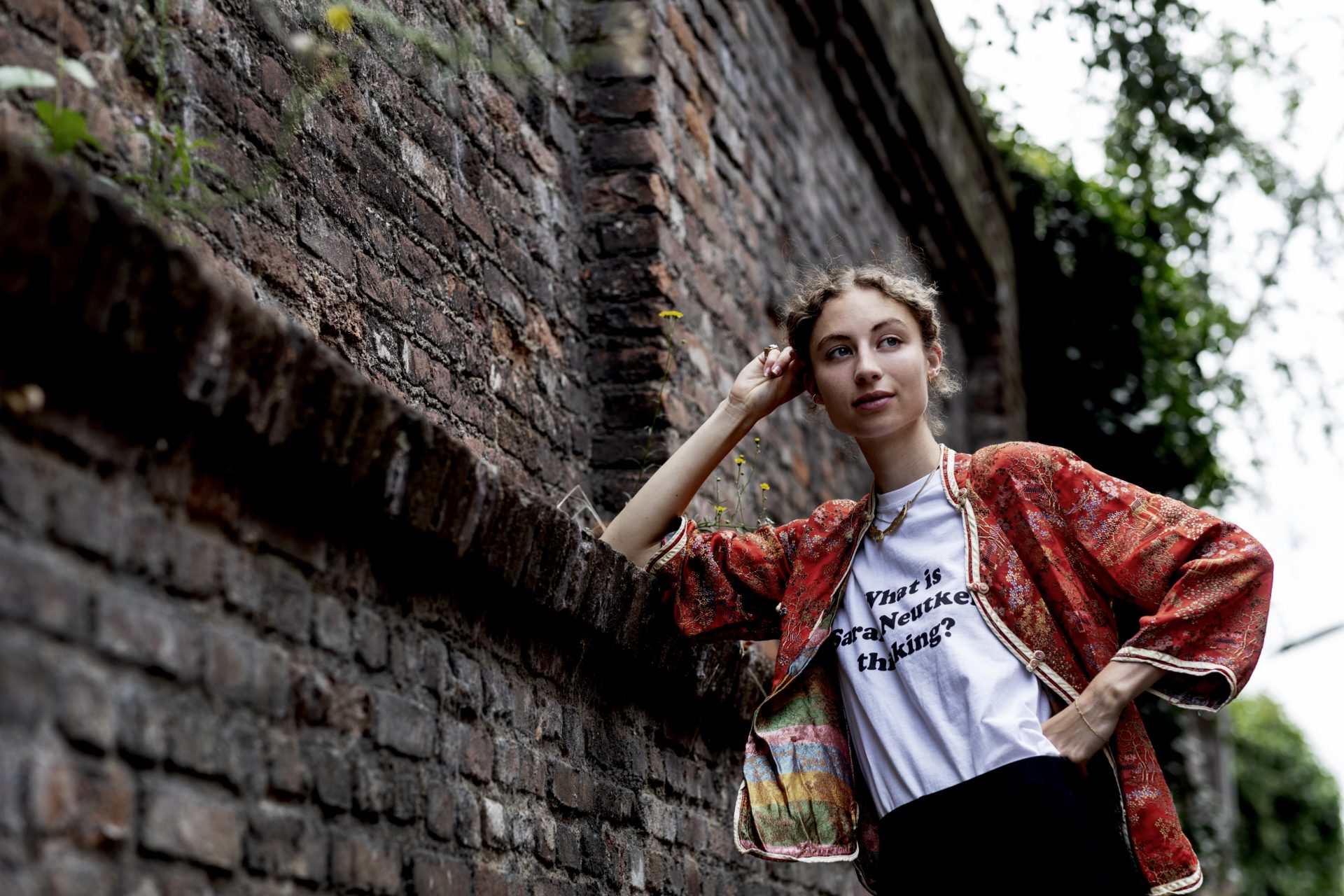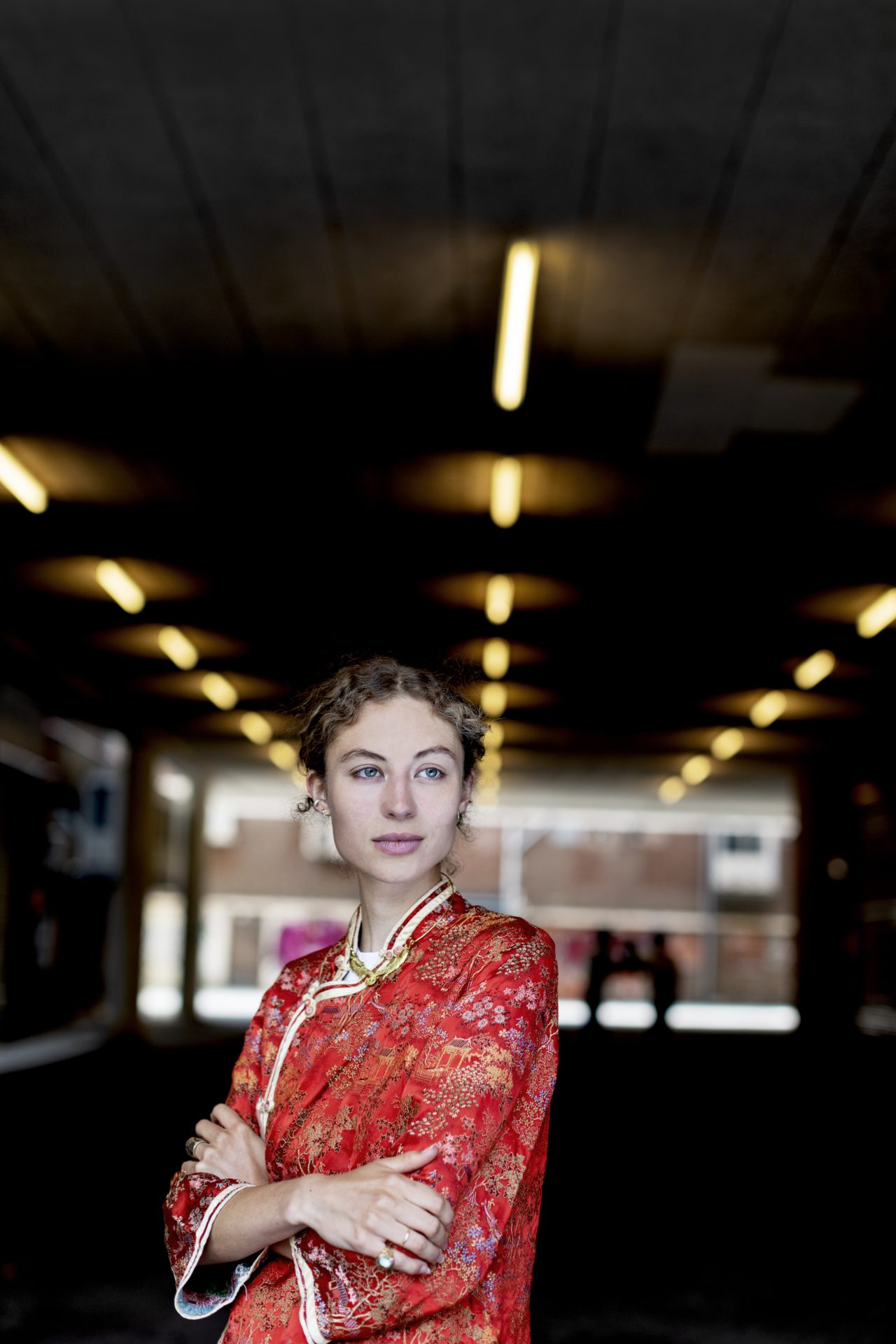Summer interview (6): All-rounder Sarah Neutkens won’t ever do anything sensible again
-
 Sarah Neutkens. Foto: Duncan de Fey
Sarah Neutkens. Foto: Duncan de Fey
Composer, writer, model, artist: twenty-two year old Sarah Neutkens won’t allow herself to be pigeonholed. Thanks to a strong desire to get out there and work, and create things, this obstinate autodidact just knew that successfully completing the Art History programme was the only way forward. Last year she spread her wings, which subsequently led to her show in Carré and Into The Great Wide Open. She has her own unique way of doing things. 'I often tend to ignore sound advice.'
Sarah Neutken’s first year as a graduate ended with a bang. After ten sold-out shows in Carré, she collapsed. The audiovisual live performance WITHIN WITHOUT was an extremely intensive project, in which she not only participated as a performer but also as a composer of her very own contemporary classical music. The morning after the last show saw her back at work, answering people’s questions about sending invoices and making programme proposals. But she was absolutely exhausted. She hadn’t had a day off in twelve months. She’d worked from morning to night, going from one project to another. She decided to go and see her doctor about getting a blood test. And while she was there, she fainted.
‘I’d pushed myself to the limit. I’d also done it because I just wanted to see if I could push myself that far. I always want to go just that little bit further, I want to cross that line.’
Soon after this incident, she was taken on holiday by one of her aunts. Which turned out to be exactly what she needed at that very moment. Her aunt took care of everything and made sure that Neutkens wouldn’t be doing any work for a while.
‘Things need to change from now on. I have to slow right down. But that’s not something that comes naturally to me. When Bauke Mollema won a stage of the Tour de France, I heard a man say on the radio: ‘Bauke just doesn’t listen’. And I knew exactly what he meant. I often tend to ignore sound advice. I’m extremely stubborn.’
It was a busy year, but one with nothing but highlights. For example, on the island of Vlieland, she collaborated with musicians on the Into The Great Wide Open festival, her music was played at the BBC, she wrote a novel and subsequently signed a contract for that novel with the publisher Prometheus, she was asked to act as an ambassador for the Young Stedelijk project at the Stedelijk Museum, she was a fashion model in Harper’s Bazaar and she made the NTR programme MUST. And in between all of this, she continued to compose and perform. Which was great, but it was also a lot. Maybe too much.
‘I haven’t really been able to enjoy it all yet. I’ll have to learn how to say ‘no’ to things now. And as part of this new approach, I’ve decided to stop accepting composition commissions. My family and friends think I’m crazy, because that’s how a composer primarily makes their living, but I need to guard my freedom. Writing because you have to write just doesn’t work for me. I’m not so much a craftsman; I’m more of an artist.’
Autodidact and cum laude graduate
Freedom is paramount to Neutkens. She’s a deliberate autodidact. She started taking piano lessons at the age of seven, and after just one year she was already composing her first pieces. Yet she chose not to go to the conservatoire. ‘Conservatoire students have a lot of technical expertise, but that’s not the direction that I wanted to take. Music has to come from deep within. It’s not something you can learn. When I have to really think about music, something gets lost. Even when I was taking piano lessons, I actually started to feel pretty stifled. I need space to do things my own way. I wasn’t cut out for school either. I had quite a lot of difficulties at both secondary school and university.’
Neutkens was born in Eindhoven and grew up in Vessem. She chose to study in Nijmegen. ‘I decided to study English because I love English literature. But during the first year of my study programme, I lost my love for the language. Then I switched to the Art History study programme. And although I really enjoyed dealing with the philosophical and socio-cultural aspects, I also suffered a temporary glitch. During my three-year study programme, I just stopped going to museums. I often felt that talking about art was nonsensical. Too much time was spent searching for the reason behind an artwork’s creation. I believe that artists are just born that way: you’ve either got what it takes to become an artist or you don’t.’
Her Bachelor’s Thesis was about the use of the artist’s concept of space in Zarina Hashmi’s and Do Ho Suh’s works. Firstly, this concerned the spaces that you carry within you because of where you have lived, and secondly, it pertained to creating space for yourself. ‘In the artists’ case, there was an obvious connection between the theme of their work and their personal background. This is something that they talked about themselves. So, then I dare to say something on this topic, but it’s quite rare.’
Despite her sceptical attitude towards her studies, Neutkens graduated cum laude. ‘I give one hundred percent in everything that I do. And that’s why the majority of my time at university was devoted to composing and studying. I never went out and socialised. I never experienced those carefree student days that you hear other people reminiscing about.’
‘I never experienced those carefree student days’
Neutkens chose not to do a Master’s degree. ‘I was told that if I didn’t, I’d earn less money and that I’d have fewer opportunities. And I thought to myself: so be it. I just want to get out there and get on with it. I want to create things. I want to go full speed ahead right now. I want to create my own market and grow my own business.’
That moment one year ago, when she received the call to say that she’d graduated, was a significant one. She still had ten minutes to go before she had to go on stage for her CD presentation. ‘After hearing the news, I scoffed down a bit of pasta and then took to the stage. And I remember what went through my mind at that very moment: From this point on, I am never going to do anything sensible again.’
Knocking on doors
Neutkens has already achieved a lot at a young age, but it certainly didn’t all just fall into her lap. She’s not the type who likes to wait around; she prefers to take things into her own hands. For example, for the four albums that she’s already released, she personally asked each of the musicians to take part, she organised the venue, and also arranged the production, distribution, marketing and PR. And she paid for it all with her own money. ‘That’s a huge sort of risk. And one that always makes me extremely anxious. But up until now, I’ve pulled it off every time.’
She’s also quite sceptical of subsidies. ‘I’m way too independent for going down that route, I’m too much of an entrepreneur. I want to be one hundred percent self-sufficient. Subsidies are taken for granted in the art world, which is something that I’m quite critical of. They may sometimes be necessary when it comes to larger productions, but you’ll never see me requesting that sort of help for myself. Artists think that they qualify for that kind of assistance because they work hard, but there are people everywhere who work hard and get paid absolutely nothing. The people who work at the university also work a lot of overtime without getting paid any extra money for their efforts.’
The DIY mentality is hardwired into Neutken’s DNA. She comes from an entrepreneurial, artistic family. Her father is a musician and visual artist, her mother is a designer and furniture maker and her grandfather had his own organic seed company. ‘I grew up with the idea that if you want something, you have to go out and get it yourself. I tend to knock on doors quite randomly. Some people are easily embarrassed about taking that first step. I have absolutely no threshold, nor do I suffer from envy or jealousy, which is what makes the whole process such great fun. I take exactly the same approach in my modelling work. I’ll often call up a fashion company that I’m interested in. That sort of approach has resulted in more than a few exceptional photo shoots.’
Neutkens now believes that a label could be quite beneficial to her music. ‘I’m ready to relinquish that type of control for my next CD. I’m more than happy to let a label take over the distribution and marketing. But that’s all; they won’t get to have a say when it comes to the music. There’ll be no re-recordings, and no artistic concessions. And if I can’t find a label that meets my needs, then I’ll just keep doing things in exactly the same way as I’ve been doing them up until now.’
The call of nature
In the same way as Neutkens believes that it’s nonsensical to talk about art, she prefers not to talk about the ideas behind her own work. ‘It’s something that you just have to experience as a listener or reader.’
According to her, there’s not that much to say on the subject. ‘It’s just something that I need to do. For me, composing music and writing words is not unlike the call of nature. When you feel the urge, you just have to give into it.’
For Neutkens, everything is created in a vacuum, as she calls it. The same goes for writing her novel. ‘I once pulled the car over to the side of the road so that I could get my thoughts down on paper. Once the ideas start coming, I tend to sleep quite badly. It’s gruelling. The words have to come from deep within. It’s quite an intuitive process. This book has had to find its own form. I was quite terrified of working on it.’
She describes her music and her fiction as being quite dense. As something that can’t be ignored. ‘The whole process needs to begin with one good idea, which then needs to grow, but the process has to make sense right from the very start. And it shouldn’t require too much thought either.’
Writing stories was not just a string that Neutkens subsequently added to her bow. She’s always written, in the same way that she’s always composed. ‘For so long, I was afraid that my writing wouldn’t possess the same degree of expressiveness, but this novel has proved me wrong. Composing and writing are the two things that I love most. The two forms are equal to each other. But when it comes to visual art, I’m still looking for the right form.’
For Neutkens, the form is secondary; it’s the idea that comes first. That’s why she’s able to switch so effortlessly between different artistic disciplines. ‘It’s all about expression. There may come a time when I stop composing completely and only concentrate on my writing. And if that happens, I’ll be OK with it, if it’s the best way forward.’
No more CVs
Neutkens has noticed that the outside world sometimes finds it difficult to accept that she can’t be pinned down. And that annoys her. ‘Sometimes they’ve even referred to my work as being neoclassical. And if there’s one thing that I hate, it’s the term neoclassical. It’s like wallpaper. I’m not a genre, I’m a person. I don’t fit in anywhere, and I don’t want to be labelled. If that’s the way it’s going to be, then I’ll stop what I’m doing.’
People sometimes react suspiciously when she tells them what she does for a living. ‘I don’t dare to send my CV to anyone anymore, because people just don’t believe what they read about me. They get quite suspicious.’
It’s therefore all the more significant that she’s not yet mentioned during this interview that she writes as a pop journalist and art historian for newspapers like the Eindhovens Dagblad.
‘People also think it seems strange that I’m not afraid to fall on my face. I also thought for a long time that I was going to become this fearful person, but I’m only afraid when I can’t make my own decisions.’
So what about collaborating with others? Isn’t that quite a difficult thing to do if you’re always taking matters into your own hands? ‘No, it’s a totally different process. Collaborating with others is just a lot of fun. I really love it when people want to perform my work. It’s like unwrapping a present. They can also take a lot of freedom in what they’re doing. The music might have already been put down on paper, but they’re welcome to interpret it in any way that they see fit.’
A novel, a CD and a symphony
The coming year is set to be a busy one. In November, Neutkens will make her writing debut with her novel Een blote man beminnen [Loving a Naked Man] and a new CD, featuring music performed by the Alma String Quartet, will be released in May. As a Young Stedelijk ambassador, she’ll also be setting up exhibitions with other young artists, organising lectures and ensuring that students are able to visit a number of interesting galleries. ‘We’re trying to break down the barriers between the big scary art world and younger visitors. One of the themes that appeals to me and that I wish to highlight in this project is space and the refugee crisis. How do you create a place in the world that means the same thing to everyone?’
‘How do you create a place in the world that means the same thing to everyone?’
In the meantime, Neutkens also hopes to continue work on her symphony. When it comes to this massive project, she also won’t be following the rules. ‘This type of work is normally only done on commission. But I just decided to start composing the music myself. The question is whether there’ll be an orchestra that will actually perform it. And the real question is whether it’ll amount to anything at all. And if it amounts to nothing, I’ll be OK with that too. I’m just enjoying working on it. I don’t owe anybody anything; I only owe myself.’






